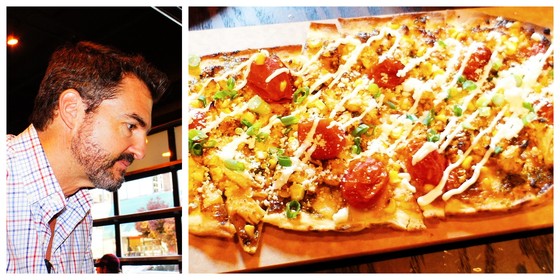Stout's owner, PaulReder; chile-roasted cauliflower flatbread
Stout, a 5,700-square-foot, 180-seat beer hall on Capitol Hill, is the latest venture from Paul Reder. He's an imaginative and fearless developer, whether rehabilitating old warehouse and showroom space on Capitol Hill or digging through abandoned mezzanines and forgotten passageways of downtown office buildings. .
Reder has been in the restaurant business all his life and put his signature on the two Tap House Grill spaces in downtown Seattle before setting his sights on Capitol Hill. For additional guidance, he takes his spiritual cues from Arnold Shain, a local food service guru, an eminent consigliere with an encyclopedic, top-to-bottom knowledge of the restaurant business and a stable of specialists (branding, marketing, regulatory affairs, product sourcing, menu development, staff training, accounting, and so on) to help his clients navigate the treacherous shoals between concept and profitability.
 At Stout--carved from the Sunset Electric Building at 11th and Pine--Reder himself has given direction to the beer list, but has left most of the menu planning to the much-admired Leslie Dillon, Shain's lead culinary consultant. But forgive me if I voice some skepticism.
At Stout--carved from the Sunset Electric Building at 11th and Pine--Reder himself has given direction to the beer list, but has left most of the menu planning to the much-admired Leslie Dillon, Shain's lead culinary consultant. But forgive me if I voice some skepticism.
Wasn't it Coco Chanel who said (paraphrasing a bit here) that when a woman is dressed and ready to go out, she should take off (and leave behind) one item? A scarf, a ring, a belt. I get the same feeling sometimes when I see how many extraneous extras they're piling on a pizza or a burger or a plate of fish.
Case in point, the new flatbreads at Stout. Aside from the basic question of "Why?" there's also the more practical issue of "How?" Every ingredient requires sourcing, preparation, storage (in bins, boxes, tubs) and a dozen or more specific steps to final assembly. How can a resident chef expect any kind of motivation or consistency from the kitchen staff?
Almost everything on the menu can be read as a paean to bacon, but, in a nod to Capitol Hill's minority of beer-drinking vegetarians, one flatbread is described as "PASILLA CHILE ROASTED CAULIFLOWER." Not ancho chilis, mind you, but pasilla, usually used only to make the mole negro of Oaxaca. And roasted cauliflower, dry and crunchy, not sweet, soft and braised. Okay, your call, but here are the garnishes: "chipotle cream, chimichurri, roasted corn, tear drop tomatoes, cotija, queso fresco, green onion, Mexican crème." Eight freaking garnishes on a $13 vegetarian flatbread. The straightforward salami version ($12) doesn't do that much better: "Mama Lil's peppers, red sauce, provolone, garlic marinated fresh mozzarella, fried capers, fresh lemon thyme." Woe betide the cook who fails to marinate the mozz in garlic!
And the Morning After Burger? A beef patty's not good enough; it's got to be blended onsite with fresh-ground bacon, then hand-pressed to within an inch of its life, grilled to the consistency of sawdust, slathered in more bacon, topped with a fried egg, and surrounded by peppery fries. Is it any wonder this overwrought style of food preparation went out of style in most Seattle restaurants two or three decades ago?
The point of this food clearly isn't to please your taste buds or to fill your tummy, it's to keep you thirsty. And here, no complaints. Twenty local, craft beers on tap at any given moment, some 70 bottles at the ready, house cocktails featuring local, craft distilleries like Citizen, Oola, Three Howls, Fremont Mischief, and Rain City's drip coffee liqueur.
And if the food doesn't grab you, you can always turn your attention to one of the 15 flatscreen TVs, or Tina Randolf's giant mural above the bar.


Leave a comment